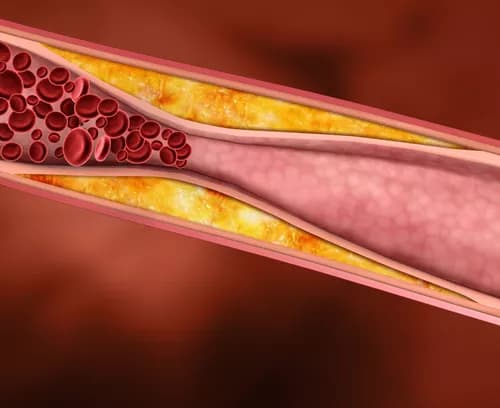
A Role For Mutated Blood Cells In Heart Disease?
A new study provides some of the first links between relatively common mutations in the blood cells of elderly humans and atherosclerosis.
Though cardiovascular disease, which is characterized in part by atherosclerosis, or plaque build-up, is a leading cause of death in the elderly, almost 60 percent of elderly patients with atherosclerotic cardiovascular disease (CVD) exhibit no conventional risk factors, or just one. This and other data suggest that age-dependent risk factors that haven't yet been identified may contribute to CVD.
Scientists know that accumulation of somatic DNA mutations is a feature of aging, though little data exists on the role of such mutations in age-associated disorders beyond cancer. Meanwhile, recent human studies indicate that aging is associated with an increase in somatic mutations in the hematopoietic system, which gives rise to blood cells; these mutations provide a competitive growth advantage to the mutant hematopoietic cells, allowing for their clonal expansion -- a process that has been shown to be associated with a greater incidence of atherosclerosis, though specifically how remains unclear.
In this study, researchers at Boston University School of Medicine (BUSM) investigated whether there is a direct relationship between such mutations and atherosclerosis. They generated an experimental model to investigate how one of the genes commonly mutated in blood cells of elderly humans, TET2, affects plaque development. Plaque formation accelerated in the models transplanted with Tet2-deficient bone marrow cells, likely through increasing macrophage-driven inflammation in the artery wall. The results strengthen support for the hypothesis that hematopoietic mutations play a causal role in atherosclerosis.
"Our studies show that mutations in our white blood cell cells, that we acquire as we age, may cause cardiovascular disease. Understanding this new mechanism of cardiovascular disease could lead to the development of new therapies to treat individuals who suffer from heart and blood vessel ailments due to these mutations," explained corresponding author Kenneth Walsh, PhD, professor of medicine at BUSM. "Furthermore, because these mutations become prevalent starting at middle age, these studies suggest that genetic analyses of blood samples could add to the predictive value of traditional risk factors -- high cholesterol, hypertension, diabetes and smoking -- that are currently monitored."
Materials provided by Boston University Medical Center. Note: Content may be edited for style and length.
Disclaimer: DoveMed is not responsible for the accuracy of the adapted version of news releases posted to DoveMed by contributing universities and institutions.
Primary Resource:
José J. Fuster, Susan MacLauchlan, María A. Zuriaga, Maya N. Polackal, Allison C. Ostriker, Raja Chakraborty, Chia-Ling Wu, Soichi Sano, Sujatha Muralidharan, Cristina Rius, Jacqueline Vuong, Sophia Jacob, Varsha Muralidhar, Avril A. B. Robertson, Matthew A. Cooper, Vicente Andrés, Karen K. Hirschi, Kathleen A. Martin, Kenneth Walsh. Clonal hematopoiesis associated with Tet2 deficiency accelerates atherosclerosis development in mice. Science, 2017; eaag1381 DOI: 10.1126/science.aag1381
Related Articles
Test Your Knowledge
Asked by users
Related Centers
Related Specialties
Related Physicians
Related Procedures
Related Resources
Join DoveHubs
and connect with fellow professionals

0 Comments
Please log in to post a comment.